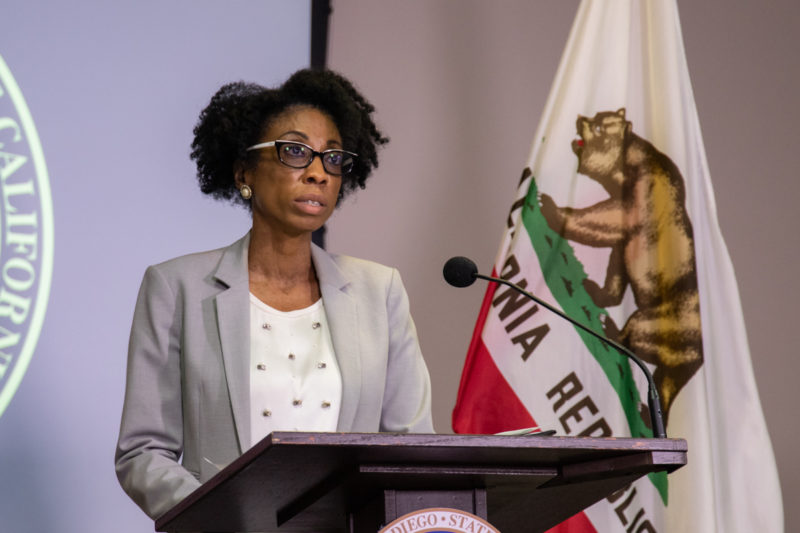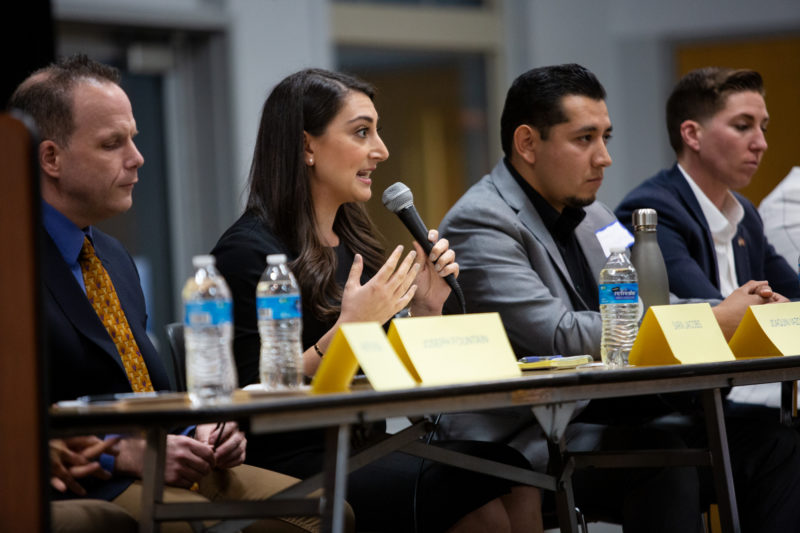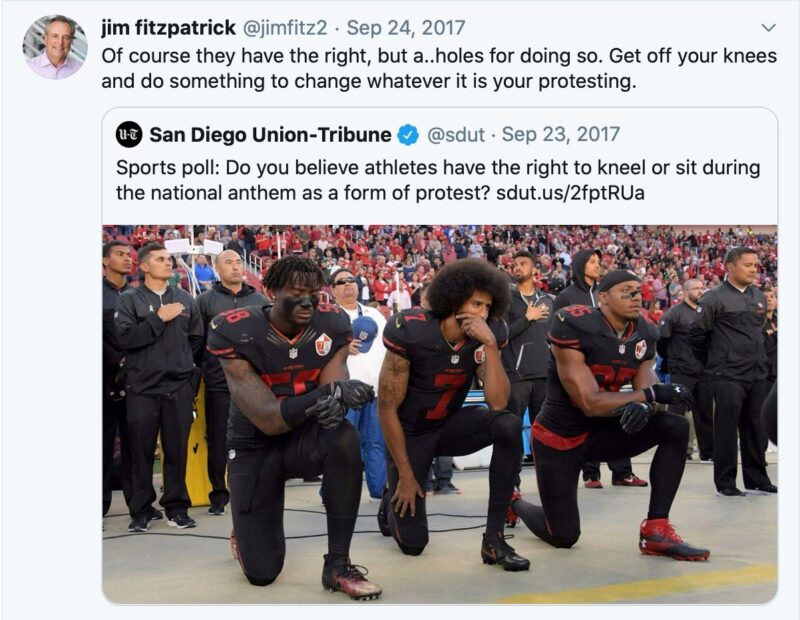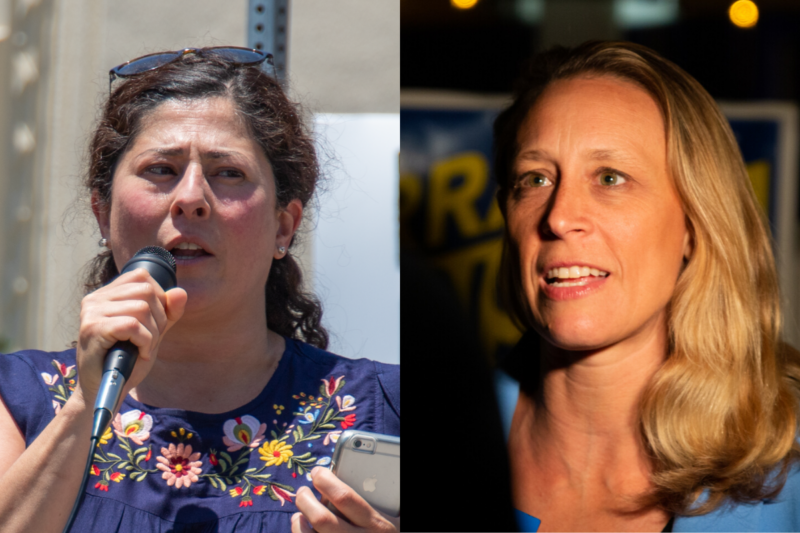
Activists flooded Monday’s City Council hearing with demands to cut $100 million from SDPD’s budget, the local application of a national movement to “defund the police.”
That movement encapsulates a range of ideas, from abolishing existing police forces to spending less money on law enforcement so you can spend more money on social services.
But the City Council didn’t just protect the San Diego Police Department’s proposed budget increase, it intervened Monday to ensure the survival of a social services program paid for out of SDPD’s budget.
The Star Pal program – for Sports Training Academics Recreation, Police Athletic League – provides mentorship and leadership training for roughly 3,000 at-risk young people through more than a dozen services like surf and soccer camps and violence prevention classes.
The group is an independent nonprofit, with an executive director paid out of the organization’s budget.
But Star Pal is staffed by SDPD, paid for out of SDPD’s budget. Mayor Kevin Faulconer’s budget proposal cut $1.3 million from SDPD by eliminating seven Star Pal positions, six of whom were sworn officers.
SDPD Chief David Nisleit said at a May 4 budget review hearing that the program’s services would be unaffected by the lost staffing. SDPD would continue to be involved, the nonprofit’s board would step up and the San Diego County Sheriff’s Department or Probation Department could lend a hand, he said. “It’s a phenomenal program, and the program won’t go away,” Nisleit said.
The independent budget analyst, in a proposal the Council used as the basis for the budget it approved Monday night, recommended restoring the Star Pal funding.
That was due, in part, to lack of trust in SDPD’s plan to maintain services even without SDPD staffing.
“I’m not comfortable at all with this new structure that we just heard about,” Councilwoman Monica Montgomery said at the May 4 hearing. “There’s no detail at all about how services would continue in various neighborhoods.”
Montgomery said she had heard concerns that the program would suffer without SDPD staffing. Councilman Chris Ward likewise expressed concern that SDPD hadn’t done enough to ensure the program’s continued success.
It’s easy to see why the Council wanted to protect Star Pal. The kids who rely on it are disproportionately black and Latino living in historically underserved neighborhoods. And the protesters who filled the streets since George Floyd’s killing weren’t dissatisfied with Star Pal’s services.
But the Council’s desire to restore SDPD funding to a sports and mentoring program for at-risk youth, at the same time it began a push to reassess SDPD’s budget to identify areas that aren’t essential law enforcementBe functions, shows just how heavy the political lift facing the defund movement is.
Montgomery Addresses Community Backlash

Montgomery delivered Friday evening a virtual “community healing address,” in response to widespread community outrage over her Monday budget vote.
In it, she echoed comments Council President Georgette Gómez made Thursday, arguing there were both political dynamics and practical considerations that played into the decision.
“I had to do a lot of reflection this week, on things that I could have done better,” she said. “First I want to apologize for the hurt and pain I caused this week … I really did not communicate in this process.”
Here’s what she decided to communicate about why she didn’t act on the community’s demands for SDPD cuts.
Political dynamics: Like Gómez , Montgomery said the Council didn’t have the votes to make the big change the community had in mind.
“In order for a Council to set at the mayor’s table a budget, we do have to have a veto-proof majority of votes,” Montgomery said. “And like I said, not all of us are on the same page with defunding the police, or diverting those monies to community services. Not all of us are on the same page, and we have to have a consensus to do something like that.”
Councilwoman Barbara Bry has been clear that she doesn’t support defunding the police, and wouldn’t have voted to override a mayoral veto. That alone deprives the Council of the six votes needed.
But during the budget cycle prior to the emergence of the defund movement, and its specific demand for a $100 million SDPD budget cut, Council Democrats had not been publicly advocating for a broad cut to city police spending. The closest proposal came from Councilman Chris Ward in the week leading up to the vote, when he asked to use $21 million in federal COVID-19 aid earmarked for SDPD on a rental relief program instead.
Practical considerations: Montgomery stressed that the $27 million increase to SDPD’s funding was owed to union contracts negotiated before she reached the Council. But she also added a new explanation for the police budget: pension reform.
“Police officers now in the city of San Diego are the only city employees who have defined benefit pensions, and that just costs a whole lot more than what we’re paying our other employees, so that increases their budget significantly,” she said. “That was a decision made by voters, via Prop. B, back in the day.”
Proposition B, a pension reform initiative approved in 2012, deprived new city employees — except cops — of receiving guaranteed retirement benefits. Councilman Carl DeMaio had sought to eliminate pensions for all employees, but then-Mayor Jerry Sanders and Kevin Faulconer, then a City Council member, secured a compromise to protect police pensions.
If the defund movement finds common cause with pension reformers, well, it will be the most unlikely political marriage in some time. (No, we do not believe that’s likely to happen.)
Though, an aside: County Supervisors Kristin Gaspar, Greg Cox and Dianne Jacob last year reduced the pension benefits of future deputy sheriffs significantly so the money could be used for other needs in the county. They were hip to the defund the police movement early on, though not as early as DeMaio. And it didn’t even hurt them politically. The Deputy Sheriffs Association endorsed Gaspar’s re-election.
Future plans: Given the current mayor and Council, Montgomery said she believes a more successful path to diverting SDPD funds to other services begins with an assessment from the independent budget analyst, which she requested this week. Montgomery, or anyone else on the Council, could have requested this analysis anytime before Monday’s hearing.
“We directed them to go through that budget line by line so we could figure out what to move and what to divert and what to reallocate to the most needed funds that will benefit our communities, and go about it that way,” she said. “We are doing a deep dive that I don’t believe has ever been done.”
She did not say when that process could result in a formal proposal. Regularly the next opportunity would be during the mid-year revise, when the city makes spending adjustments based on how much it has spent and how much it has collected halfway through the year. But this year it could happen sooner, because the city is revisiting its budget quarterly, due to uncertainty from COVID-19.
“We are absolutely looking to divert services,” she said. “We will need community input and support. I don’t believe officers should be going out on mental health calls. I really believe there’s a better way to deal with our unsheltered populations.”
Watch or listen: We had a long conversation with Gómez about her decisions this week. You can watch it and all the comments she responded to from the audience here or listen to our podcast edited version.
The show was part of our Voice of San Diego at Home series, which is getting pretty interesting. You can watch Voice of San Diego at Home, hosted by Scott on Monday and Wednesday on the voiceofsandiego feeds on Twitter, Facebook and YouTube. Fridays, a member of the staff hosts.
Sara Jacobs Says She Would Have Defunded the Police

Gómez has been pretty busy. She balanced this budget drama after helping shepherd the largest land deal in the city’s history. Then there’s the fact she’s also running for Congress.
Yes, there’s still a congressional campaign going on. Gómez told us on the podcast that she had expected to be able to take some time off after the primary election but obviously the world had different plans for all of us.
We checked in with Sara Jacobs, Gómez’s rival in the 53rd Congressional District race, to see if she had any criticisms for Gómez’s performance and she did.
In a written statement, Jacobs said that the city needed to rebalance its priorities and budget and to “demilitarize” the police. She hit Gómez for not acknowledging what the callers had requested and said she would have tried to redirect money from the police budget to mental health services and homeless outreach.
“I wouldn’t have voted for it in its current form,” Jacobs said, of the budget.
What Is Going to Happen to Schools? ¯_(ツ)_/¯
Last week, we highlighted a tweet from John Lee Evans, an outgoing school board member for San Diego Unified School District. It had his hot take on what schools should do this fall.
“Distance learning doesn’t do it. It’s time to talk about physically reopening our schools. With adequate testing/tracing and affordable safety measures we need to find a way to physically reopen #sdschools in the fall. Partially reopening doesn’t work for students or parents,” he wrote.
It was pretty definitive: Open the schools.
We asked the two people hoping to replace Evans this year what they thought.
Sabrina Bazzo: Bazzo is active volunteer in Mira Mesa schools and is supported by the San Diego Education Association, the teachers union. She wrote us a response saying she agreed with Evans … to a point.
“Distance learning is causing many of our most vulnerable students to fall behind even further,” she said. But she said schools aren’t ready to open either.
She said schools need more nurses, mental health counselors and more custodial support, which means they need a lot more money.
“I believe most parents and school staff would agree that these policies need to be put into place with funding to support them BEFORE the school doors reopen for our students,” she wrote.
Crystal Trull: Trull was a nonprofit executive turned consultant. She wrote to us she wasn’t certain she understood Evans’ tweet. There’s a lot more than testing and tracing involved in reopening schools. But she did agree with Evans on one point.
“Distance learning has not only failed our students, but parents are angry and frustrated,” she wrote.
She also said she wanted, like him, to see affordable safety measures put in place — people to manage hand-sanitizing, mask-wearing, temperature checks and other efforts.
“But, if staff (i.e. classified staff and teachers) are the ones that will implement these measures, it WON’T be affordable. The only way I see ‘affordable safety measures’ put in place is through the use of volunteers and/or partnering with local agencies to provide support services. But, because of contracts, volunteers can’t be used for paid positions,” Trull wrote.
We’ve been collecting updates: The best way to follow what local school districts are doing is often through the emails they send parents.
San Dieguito Union High School District told parents, for example, that it would offer some distance learning but would be opening campuses with some modifications, including this confusing description of requirements (emphasis ours):
“The current San Diego County Public Health Order allows for the reopening of schools following the guidance issued by the California Department of Public Health (masks are encouraged, but not required; 6 ft. separation when practical but not required at all times.)”
We’re not sure what “practical” means there.
Poway Unified School District told parents that they will likely either have to choose distance learning or go back to classrooms. There won’t be a hybrid. “The District has analyzed various blended learning models (partially in-person and partially virtual), and at this time, they do not appear to be viable for Districtwide implementation.”
Cajon Valley will have a hybrid, blended model available. Will Huntsberry’s story broke down the district’s plan, which seems to be the first clear one.
San Diego Unified Superintendent Cindy Marten backed off her take that there’s a chance physical campuses may not open this fall. “I wanted to assure all families we will have both in-person and online options for students to choose from in the fall,” she wrote.
Private schools don’t seem to have figured anything out. The Bishops School administrators sent parents an email saying they’re either going to do school on campus, a blended hybrid or all distance learning. And they listed all the possible ways that could look.
“Our commitment to the students and their education and development is unwavering in whatever form we provide that experience,” they wrote.
Nobody knows anything about what kids will do in the fall.
David Alvarez, Shipyard Lobbyist
When former Councilman David Alvarez was running for mayor in 2013 and 2014, a big part of his political biography suddenly became a big part of citywide politics.
The City Council had just approved a new community plan for Barrio Logan, a set of land use regulations that aimed to create a buffer between residences in the community and the potentially harmful industrial activity in the nearby shipyards.
After the Council’s vote, though, the shipbuilders collected enough signatures to force the decision to a citywide vote. The industry heavily outspent the community groups and environmental justice activists who supported the plan, and won big in June 2014, throwing out the plan on a campaign that pit jobs against the environment.
Alvarez, running for mayor at the time, wasn’t just the Council representative for Barrio Logan. He had also grown up in the area, and attributed his asthma to the pollution – from the shipyards, the highways that intersect the community and other industrial activity allowed to co-mingle with homes – he experienced growing up there.
Last month, the Environmental Health Coalition, a nonprofit group that led the campaign to support the Barrio Logan plan, again found itself advocating against the shipbuilding and ship repair industry.
Austal USA, a U.S. subsidiary of an Australian company, had proposed a new ship repair yard on Port of San Diego property, just south of Barrio Logan in National City, as VOSD’s MacKenzie Elmer reported this week. EHC asked commissioners not to pursue the project, citing the health effects for nearby residents. The company asked the Port to launch a study exploring their idea to put a ship-repair facility on the property they had identified. The Port decided not to, but the Navy could consider putting the same facility on its property, where it would be exempt from local regulations.
Making the case for Austal USA, though, was Alvarez. He’s been out of office since 2018, and signed the company as a client through his consulting firm, Causa.
In an interview, Alvarez said it was an unusual position for him, too. After all, volunteering for EHC to organize against the conditions in which he grew up had served as his entry into local politics.
“I wouldn’t call it ironic, though maybe to the outside world it is, but as time goes by, and I’m still young, it’s just fascinating how everything is interconnected in this world,” he said.
Alvarez said he called EHC’s longtime executive director Diane Takvorian in December to discuss the proposal.
“I believe the concerns of air quality could have been addressed and would have, but we’ll never knew that because we didn’t have a project, just an idea,” he said. “I viewed myself as someone who could bring folks who aren’t listened to into the process. (EHC’s) perspective was, ‘we’re not interested in any ship-repair operation.’ It’s a difference of opinion, but I think we would have reached a good conclusion for the community, to address the required regulations.”
Black Lives Matter Tweets Haunt SD Mag Owner
Jim Fitzpatrick, owner of San Diego Magazine, told us in March, after he laid off most of the magazine’s staff, that the magazine would come back. It seems like he may be trying to make that happen. But now he’s got a different mess on his hands.
Fitzpatrick, a member of the Lincoln Club’s board of directors, has always had conservative views on display in his Twitter feed. But this week, his posts insulting quarterback Colin Kaepernick and NFL players for protesting police brutality got more attention than he may have been used to. This post from SanDiegoVille.com collected some of the worst.

By Friday, Fitzpatrick was apologizing.
“My posts were insulting, and they disregarded the severe problem of police brutality toward black people in America. I regret that it took the recent tragic killing of George Floyd for me to understand. I deeply and sincerely apologize for those messages and for the hurt I may have caused by posting them. Black lives absolutely matter. I support Kaepernick, and I support the peaceful protestors who are putting their safety at risk to make their voices heard,” he wrote.
Vicious Facebook Exchange Between Diaz and Lawson-Remer

In the olden days, before the pandemic, we reported in these pages about the planned unity breakfast called by Democratic Party and labor leaders. Democrats who supported Terra Lawson-Remer were going to meet up with Democrats who supported Olga Diaz to break bread and proclaim their support for whichever one was advancing to take on Republican Kristin Gaspar in the District 3 county supervisor race.
“Both of our candidates have agreed to attend and unequivocally support whichever candidate wins the primary,” read the announcement of the breakfast to be held March 6.
It was a sign of both how bitter the divide between the candidates and their supporters had gotten and yet how crucial Democrats consider the race. It will determine the future power share on the county Board of Supervisors. And thanks to the pandemic, a lot more people know and care about what’s happening at the Board of Supervisors. If Gaspar wins, a much more conservative board will oversee the vast county operations.
If Gaspar loses, Democrat Nathan Fletcher is likely to become the chairman of the board and it will have much different priorities.
Lawson-Remer prevailed but the unity breakfast didn’t happen. Diaz wanted to see more votes counted.
But then came the COVID-19. Nobody was having breakfasts. But people still managed to communicate. And yet there was no Zoom unity breakfast or virtual endorsement.
That may be because Diaz doesn’t appear to be interested in endorsing Lawson-Remer. It came out this week when both of them, and their supporters, engaged in a brutal Facebook exchange Tuesday evening after Diaz accused Lawson-Remer of co-opting her campaign research and content.
The original Facebook post was public by Diaz but now is limited to her Facebook friends. It generated hundreds of comments of back and forth and broke into another dispute about mailers attacking Diaz. Lawson-Remer addressed them at one point:
“[A]s I’ve already said to you directly, I want to apologize publicly for the mailers that went out against you in the primary. Although not sent by me or from my campaign, we need to be better than that,” Lawson-Remer said.
Diaz wasn’t having it.
“Your failure to prevent outright attacks of my character and my record is unforgivable. You benefit from my sacrifice and work in North County and your privilege is a reflection of everything wrong with politics and society,” she wrote.
“My endorsement will have to be the only thing she’s ever earned in her life. It won’t be easy,” she told a supporter in another comment.
The district continues to shift: Lucas O’Connor, a political staffer for Councilman Chris Ward, made a series of interesting observations from voter registration data. The shift left continues very strong.
O’Connor noticed that just since 2018 the District 3 registration had shifted significantly toward Democrats. In 2018 Democrats had 33.4 percent of voters and Republicans had 29.7 percent. Now Democrats have 37.7 percent and Republicans have 28.8 percent.
Redistricting Is Cool
The League of Women Votes wanted us to get the word out that very few people have so far applied to be on the city of San Diego’s redistricting commission. Check it out.
If you have any feedback or ideas for the Politics Report, send them to scott.lewis@voiceofsandiego.org or andrew.keatts@voiceofsandiego.org.

